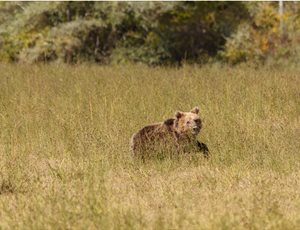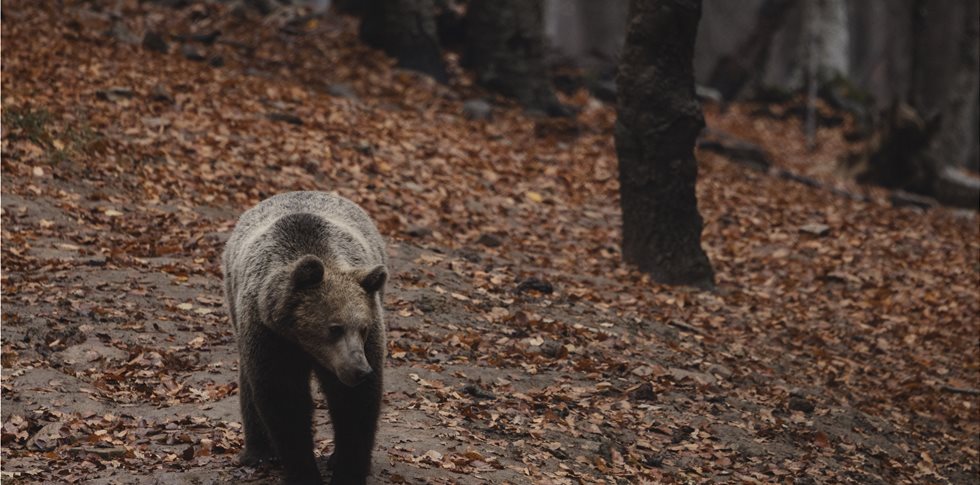Unplanned Renewable Energy development threatens bears and biodiversity in Greece
New scientific publication by ARCTUROS documents for the first time the conflict between energy transition and nature conservation
The acceleration of the green transition is essential. However, a new scientific study by ARCTUROS, recently published in the prestigious international journal Journal of Environmental Management, reveals that the way Renewable Energy Source (RES) projects are spatially developed in Greece threatens one of the country’s most emblematic and protected species: the brown bear (Ursus arctos).
Conducted within the framework of the Large Carnivore Connect project, supported by PONT and implemented by ARCTUROS, the study shows that RES projects, especially wind farms, are often located within or adjacent to the core areas of bear habitat, without adequately considering the species’ presence. As a result, over 50% of suitable bear habitat lies within a 5-kilometre radius of existing or planned RES projects.
Although photovoltaic installations tend to be developed in areas of lower natural value, their over-expansion affects movement corridors used by bears and other wildlife, disrupting the ecological connectivity of ecosystems.
The bear: an “umbrella species” for all of nature
The brown bear is an umbrella species: by protecting it, we ensure the survival of dozens of other species of animals and plants sharing the same habitat. Its presence is a key indicator of the health of Greece’s mountain ecosystems in Pindos and Rhodope, among the most important biodiversity hotspots in the Mediterranean.
Any loss or fragmentation of these ecosystems affects not only the bear but the entire ecological balance, in areas that serve as both natural lungs and biodiversity treasures for the country.
Institutional risks and national commitments
The study warns that unplanned RES development may lead Greece to breach its European obligations under the EU Habitats Directive and the EU Biodiversity Strategy.
In particular, it highlights the risk of failing to achieve a “favourable conservation status” -that is, maintaining a healthy and viable population- for the brown bear. This would have consequences not only for the species but also for Greece’s institutional credibility at the European level.
The solution: a smart and fair energy transition
ARCTUROS stresses that the problem is not renewable energy itself, but how it is being developed.
The solution lies in an energy transition that combines climate protection and biodiversity conservation-not one at the expense of the other.
The study proposes three key policy measures:
- Redesigning the spatial planning of RES projects based on scientific data on species and ecosystems.
- Improving the quality of environmental assessments, ensuring that the real ecological impacts of each project are properly evaluated.
- Systematic monitoring and evaluation of impacts before and after project implementation.
Statement by Dr Alexandros Karamanlidis, General Director of ARCTUROS
“The transition to renewable energy sources is absolutely necessary for the planet’s future. But it must be achieved in a way that respects and protects nature.
The brown bear is an indicator of the health of our mountain ecosystems; any threat to the species is a threat to an entire web of life.
Our study shows that there is still time to plan correctly, so that we can win both for the climate and for biodiversity.”
About the study
The paper, entitled “Unsound renewable energy source development threatens an umbrella species in a Mediterranean biodiversity hotspot”, was published in the Journal of Environmental Management.
The authors are Dr Alexandros Karamanlidis, General Director of ARCTUROS, and Miguel de Gabriel Hernando, scientific collaborator of ARCTUROS.
The study is based on 20 years of brown bear monitoring data in Greece, combined with the mapping of 1,395 wind and 4,430 solar energy projects.
Its results show that if current spatial development continues, more than half of the suitable bear habitat in Greece will be affected by RES infrastructure and associated human activity.
RECENT ARTICLES

ARCTUROS research based on 22 years of data shows that an increase in bears in Greece does not mean more damage
Read more
MY FAVORITE HERO… THE WOLF! Environmental Education Programme about the Wolf in Parnitha and Greece
Read more
